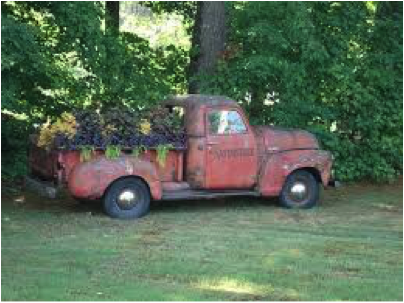
Several of my friends and I were sitting around the fire pit reminiscing about the men from our childhoods who had influenced our lives. Though men are often portrayed on television and in the movies as insensitive and unfeeling klutzes, such is hardly the case.
As we were sipping our cold beverages, my friend Mike recalled the story of a man named Nelson who lived in his town. Nelson was poor. He and his family barely made ends meet. His primary job was working for a dry cleaner pressing clothes, but he held odd jobs as a delivery driver, a handyman and a painter.
He had an old truck, and he would also go around town finding pieces of metal to sell as scrap to a junkyard. Anything that would support his family was not beneath Nelson. One Sunday, Mike saw Nelson taking his wife to church in that old truck. He said they seemed “happy enough.” Nelson was a man who could easily smile. His teeth were not exactly all there because even back then, good dentists cost big money. When he smiled, you noticed what was there rather than what was missing!
I might as well tell you that Mike did not share a rag to riches story. Nelson never found buried treasure or pieces of gold hidden in an old cookie jar or anything like that. He discovered something far more important.
The Vegetable Stand
Mike’s family owned one of those traditional stationery stores. He grew up in that store selling papers, magazines, five-cent cigars, rubber bands and such. Next to their store was a fancy greengrocer. The greengrocer sold incredible fruits and vegetables. The wealthy would shop there, or their maids and cooks would shop there. Behind the greengrocer was where the owners threw the vegetable crates and the old or rotting fruits and vegetables.
Nelson had worked out a deal with the owner. Usually, on Saturday evenings, the owner let Nelson pick over the scraps and, for a pittance—pennies on the dollar, really—Nelson was allowed to cut away the rotting parts of the fruits and vegetables and take them home.
Mike recalled in great detail how Nelson would take celery stalks, cauliflower, broccoli, onions or other produce in one of his large hands and delicately cut away the rotting parts with a huge, razor sharp knife expertly held in the other hand.
As Nelson would cut, he would talk to young Mike in kind and gentle tones, but he called him “Mr. Michael.” They would chat about grade school or baseball teams and once or twice about Nelson’s days in WWII when he was a young man in Europe.
Nelson told Mike he learned how to shoot a gun and fight and such, but he never shared details except to show Mike scars from shrapnel. He said he got medals and one was called the Purple Heart. Nelson would fill a crate or two with his food scraps, load them and then be on his way.
Mike stopped his pleasant recollection to interject a serious note:
“I could not put it into words, I didn’t know how,” said Mike. “My young mind was angry at the indignity of a man, a veteran, buying rotten produce outside of a fancy store.”
He continued.
One Saturday evening, as the stores were beginning to close, Nelson was out there as usual, cutting scraps and filling crates. It was a bitterly cold day, and Nelson was feverishly working. Mike asked him how he was doing.
“Oh tomorrow I have more than usual,” said Nelson. “It’s going to be a busy night, but a good evening.”
Nelson explained he was making several pots of soup for his church. Every Sunday they made soup for the poor, but being Thanksgiving that week, and it being cold, he wanted to make double.
“Poor people depend on me,” said Nelson.
My friend Mike could not speak for a little while. I must admit, I felt a lump in my throat as well. I looked over and saw our friend Chris wiping his eyes. Mike said he never forgot what Nelson taught him.
Nelson understood what was important in life, and he never took anything for granted. People far less fortunate needed him, and he honored that.
How many who shopped in front of the store, I wondered, were as rich as Nelson? How many were as loving? Real wealth is not a matter of bank accounts and assets. It’s in the values we live, the people we help and the legacy we leave behind.
For more information about Hall of Fame speaker and bestselling author Steve Gilliland, please contact steve@stevegilliland.com / 724-540-5019 / www.stevegilliland.com.